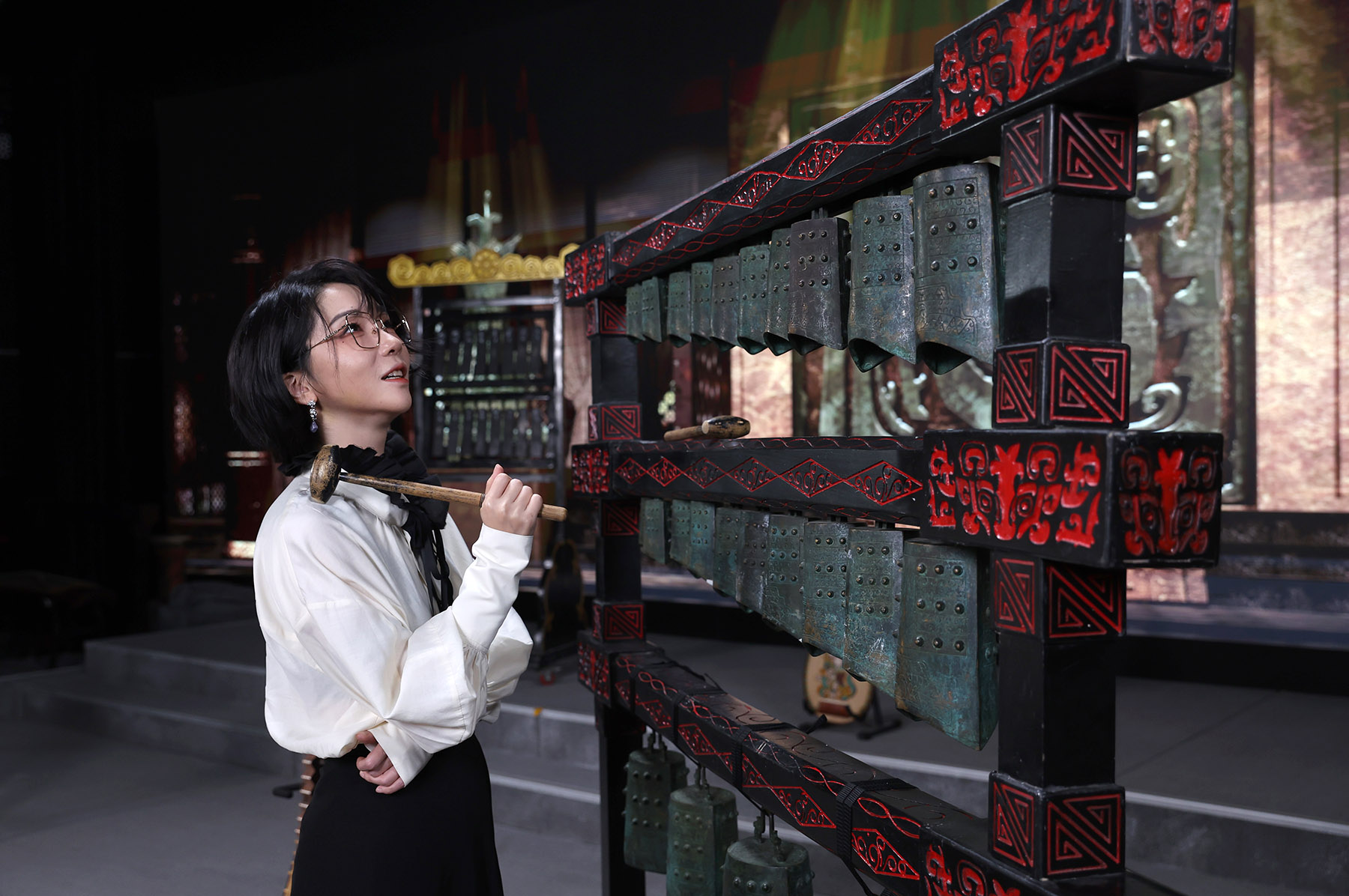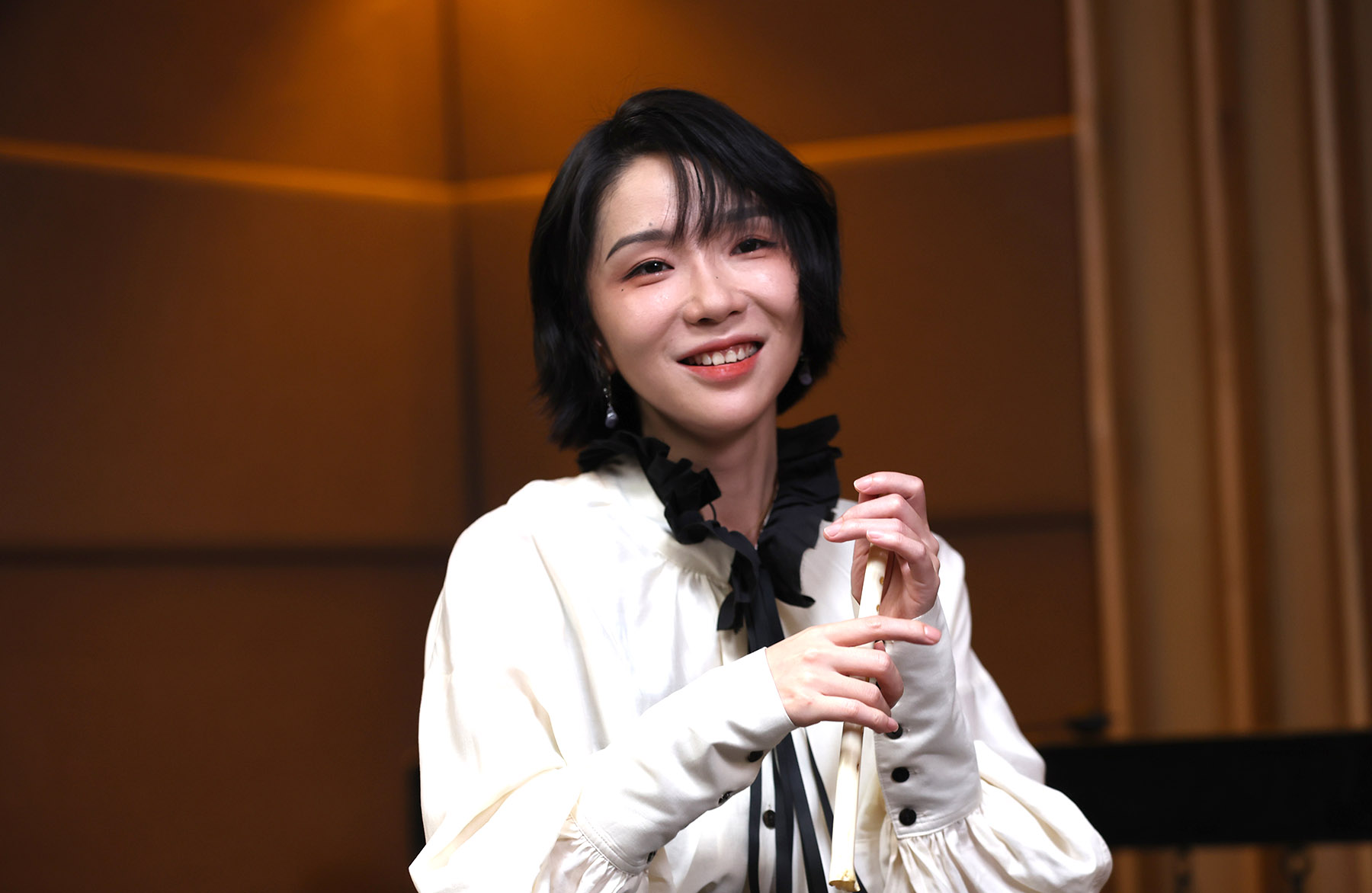Singer-songwriter finds that museums, and their treasures, ignite her musical curiosity and passion, Chen Nan reports.

"Imagine the anticipation as you approach an exhibit dedicated to ancient civilizations. It's a moment akin to hearing the opening chords of a favorite melody," says singer-songwriter Liu Lian, when asked about her recent visit to Henan Museum in Zhengzhou, the capital city of Henan province.
"It's just like the songs of your favorite singer that you've listened to hundreds of times. The artifacts, once distant images in textbooks, are now right in front of you in tangible form," she adds. "Each visit to a museum unfolds like a song, with artifacts resonating like familiar tunes, stirring memories and emotions."
My passion for museums remains even though I am a singer now.
Liu Lian, 34, singer-songwriter
The 34-year-old, who rose to fame as one of the members of the pop duo, Mr Miss, graduated from the School of Archaeology and Museology, Peking University, in 2012.
Despite her career in music, Liu says that she has always enjoyed visiting museums around the world and is enchanted by artifacts from thousands of years ago.
While at the Henan Museum, she saw the Jiahu bone flute. Unearthed from Jiahu Site in Wuyang county, Henan, it is one of the most spectacular objects in the museum's collection, and attracts lots of visitors.
READ MORE: A Chinese beat for the world stage
The introduction that guides from the museum gave her about the bone flute was intriguing. They said that about 8,700 years ago, a red-crowned crane died and one of the bones from its wing was turned into a flute by drilling holes in it to make music.
When Liu was invited to a live performance of the Huaxia Ancient Music Orchestra, the museum's resident ensemble, which is known for reviving ancient musical traditions and which performs using 10 replicas of ancient musical instruments from the museum, she was able to hear a duplicate of the Jiahu flute in action.
"Like many other artifacts in the museum, these silent objects speak volumes about the lives lived centuries ago. Thanks to the orchestra and the people who replicated ancient musical instruments, we are able to enjoy the sound of instruments from thousands of years ago, which is a magical experience," she says.
"Much like a masterful conductor interpreting Mozart or Beethoven, historians and curators meticulously present these artifacts to resonate with visitors, turning the museum visit into an immersive experience, and reconnecting us with icons of history in a profoundly personal manner," she adds. "I couldn't help wondering who originally played those instruments, and when, where, and who they played for."
Besides the Jiahu flute, Liu also enjoyed performances on other ancient replicas, such as a drum and a panpipe. Even more exciting for her was the opportunity to play a set of replica bianzhong (bronze chime bells) from the Spring and Autumn Period (770-476 BC).
Standing in front of the bianzhong, which were hanging from a wooden frame, Liu struck them with a wooden mallet. Under the guidance of Huo Kun, head of the orchestra, she quickly learned how to play simple notes, with each bell producing two different tones depending on where they are struck.

She was also told that the bianzhong, which were used as polyphonic instruments, were an important part of Chinese ritual and court music going back to ancient times. To make their performances more attractive to young people, the orchestra has adapted popular songs, including from Harry Potter soundtracks. This prompted Liu to play some of her songs on the instrument.
"It was so inspiring. Seeing these artifacts up close in the museum, admiring their craftsmanship, and pondering the lives of those who made and used them offered me a deeper understanding of history's multifaceted tapestry. Now, I want to record the sound of them to use in my own work," Liu says. "It will be a beautiful combination, and will allow more people to enjoy sounds that are ancient, and yet still charming."
She also says that the visit to Henan Museum reminded her of university, when her teacher would take the class on field trips to experience excavations firsthand and make records of archaeological sites.
During her studies, Liu also trained as a curator, which makes her visits to museums different to those of others.
"I always imagine myself working in the museum. How would I display the exhibits? How would I arrange these silent objects to let them tell their stories and communicate with visitors?" she says. "My passion for museums remains even though I am a singer now."
She suggests that on their next museum visit, people should think of it not just as a journey through time, but as an encounter with artifacts waiting to tell their stories.
Born and raised in Chengdu, Sichuan province, Liu learned to play the bamboo flute as a child. She took classes for fun, but this gradually inculcated a love of music. She has been starting bands since she was in senior middle school and in 2008, after coming to Beijing to study at Peking University, she joined its guitar association, and began to perform and write her own songs.

During a singing competition at university, she met Du Kai, one of the competition judges, who also graduated from the university. In 2009, the duo began to perform as Mr Miss, producing pop and jazz songs with lyrics that told stories, and conjured up movie-like images.
After graduation, Liu worked at a public relations company in Beijing and continued with her music career.
"Du and I lived far apart, and we met when we had new ideas for a piece of music or to rehearse. The beginning years were tough but unforgettable. We performed as much as possible, and though we didn't know where we were heading, we loved what we were doing. It's still the same feeling for us today," Liu says.
One of their biggest breaks came in June 2017, when the duo won the Best Vocal Collaboration Award at the 28th Golden Melody Awards in Taiwan. They became the first performers from the Chinese mainland to win the award, and their debut album, Mr Miss, also set a record among singers from the Chinese mainland by being nominated in two other categories; Best Album Producer and Best Newcomer.
Liu vividly remembers that the day before they flew to Taipei to attend the awards ceremony, they performed in Nanchang in Jiangxi province, and due to heavy rain, their flight was canceled and they had to drive 10 hours to Shenzhen, Guangdong province, to catch another plane. Fortunately, they made it to the ceremony at the last minute. Although they missed the chance to walk the red carpet, they still managed to hug and scream in joy, and give an impromptu speech.
Thanks to their rising reputation, the duo had more opportunities to perform at events such as outdoor music festivals and reality shows. In 2019, they performed on the hit reality show, The Big Band, which helped expand their fan base.

Liu experienced real change after she appeared in the third season of the popular reality show, Sisters Riding the Winds and Breaking the Waves, which is about female celebrities over 30.
She quit her job at the public relations company and began to run her music career as a full-time role.
"It was a decision I had to make because I have more and more things to do as a singer. It's quite challenging to be my own boss, but it's also full of new possibilities," she says.
In December, Liu released a solo EP, Don't Speak, Just Kiss, which features three of her songs and demonstrates her journey into the world of self-expression as a solo musician.
ALSO READ: French singer captures hearts in TV show
For her birthday this year on April 26, she released a new song, Jiali (Beauty), which was inspired by the 2012 movie, Cloud Atlas, particularly by the characters of the cloned women, each with almost identical bobbed hairstyles and white dresses.
"I often feel anxious before my birthday arrives. Writing songs helps me relax," Liu says, adding that she has been releasing new songs on her birthday since 2017. "My creative process is not just about reflecting on myself, it also involves exploring imagination and fiction to express my thoughts and observations at the time."
Contact the writer at chennan@chinadaily.com.cn


